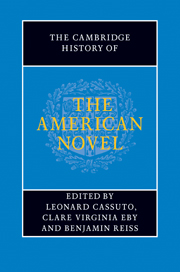Book contents
- Frontmatter
- General Introduction
- PART ONE INVENTING THE AMERICAN NOVEL
- PART TWO REALISM, PROTEST, ACCOMMODATION
- Introduction: realism, protest, accommodation
- 17 Realism and radicalism: the school of Howells
- 18 James, pragmatism, and the realist ideal
- 19 Theories of the American novel in the age of realism
- 20 The novel in postbellum print culture
- 21 Twain, class, and the Gilded Age
- 22 Dreiser and the city
- 23 Novels of civic protest
- 24 Novels of American business, industry, and consumerism
- 25 New Americans and the immigrant novel
- 26 Cather and the regional imagination
- 27 Wharton, marriage, and the New Woman
- 28 The postbellum race novel
- 29 The African American novel after Reconstruction
- 30 The rise of naturalism
- 31 Imagining the frontier
- 32 Imperialism, Orientalism, and empire
- 33 The hemispheric novel in the post-revolutionary era
- 34 The woman's novel beyond sentimentalism
- 35 Dime novels and the rise of mass-market genres
- 36 Readers and reading groups
- PART THREE MODERNISM AND BEYOND
- PART FOUR CONTEMPORARY FORMATIONS
- A selected bibliography
- Index
26 - Cather and the regional imagination
from PART TWO - REALISM, PROTEST, ACCOMMODATION
Published online by Cambridge University Press: 28 July 2011
- Frontmatter
- General Introduction
- PART ONE INVENTING THE AMERICAN NOVEL
- PART TWO REALISM, PROTEST, ACCOMMODATION
- Introduction: realism, protest, accommodation
- 17 Realism and radicalism: the school of Howells
- 18 James, pragmatism, and the realist ideal
- 19 Theories of the American novel in the age of realism
- 20 The novel in postbellum print culture
- 21 Twain, class, and the Gilded Age
- 22 Dreiser and the city
- 23 Novels of civic protest
- 24 Novels of American business, industry, and consumerism
- 25 New Americans and the immigrant novel
- 26 Cather and the regional imagination
- 27 Wharton, marriage, and the New Woman
- 28 The postbellum race novel
- 29 The African American novel after Reconstruction
- 30 The rise of naturalism
- 31 Imagining the frontier
- 32 Imperialism, Orientalism, and empire
- 33 The hemispheric novel in the post-revolutionary era
- 34 The woman's novel beyond sentimentalism
- 35 Dime novels and the rise of mass-market genres
- 36 Readers and reading groups
- PART THREE MODERNISM AND BEYOND
- PART FOUR CONTEMPORARY FORMATIONS
- A selected bibliography
- Index
Summary
Isn't it interesting that, despite having been trained for decades in the impossibility of the encyclopedia, we should continue to attempt encyclopedic projects like this Cambridge History? We can't summate, we must summate. No matter how many times, or in how many ways, we admonish each other to eschew the metanarrative and adhere strictly to petits récits, we are drawn, again and again, to the big picture. No matter how often we insist on the particularities of persons, perspectives, and populations, we are drawn to the generalized, the generic, the survey, the overview.
This predicament and proclivity is something we have in common with the regionalists, that group of writers and critics who from the 1880s through the 1930s maintained an ongoing conversation about the relation of part to whole, of center to periphery, about the interdependence – conceptually, politically, materially – of the local and the global. I say the 1880s to the 1930s, but I may as well say from the beginnings of American literature to the present, because the regionalist sensibility has always been and continues to be a central, perhaps even the central form of American literary representation.
To make such a sweeping claim begs the question of what we mean by “regionalist,” but this chapter will avoid any real adjudication of the definitional debates that have informed the scholarship in this subfield for decades. Are regions cultural constructs or natural formations? I'll just say both – that is, Appalachia is a cultural construct with mountains; Maine is a cultural construct with a coastline and fishermen.
- Type
- Chapter
- Information
- The Cambridge History of the American Novel , pp. 437 - 451Publisher: Cambridge University PressPrint publication year: 2011
- 1
- Cited by



